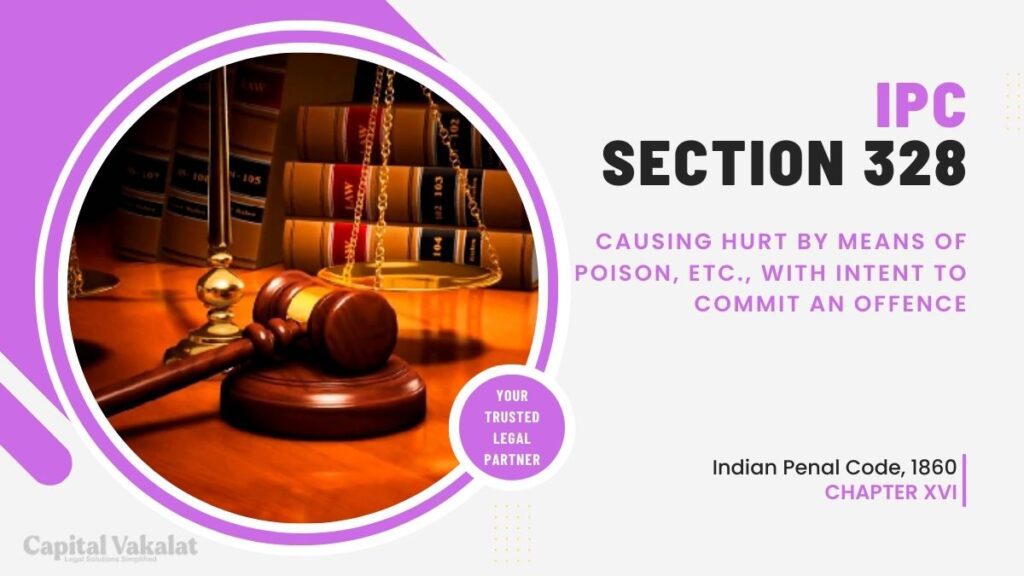In the realm of criminal law, Section 328 of the Indian Penal Code (IPC) holds a significant place. This section deals with offenses related to causing hurt by means of poison or any other harmful substance with the intent to commit a crime.

Understanding the nuances of this legal provision is crucial for both legal professionals and the general public to ensure a safer society.
Understanding Section 328 IPC
Section 328 of the IPC delineates the legal consequences of causing hurt using poison or other harmful substances. The term “hurt” in legal parlance extends beyond physical harm and includes any injury that impairs health or causes pain or sickness. Therefore, this section encompasses a wide range of offenses involving the use of substances that can cause harm to an individual.
Means of Causing Hurt
The means covered under Section 328 are diverse, including poison, corrosive substances, and any other materials that can inflict bodily harm. This section recognizes the potential danger posed by various substances and provides a legal framework to address offenses involving their use. Understanding the specificities of these means is essential for a comprehensive grasp of the law.
Intent to Commit an Offense
One crucial element of Section 328 IPC is the requirement of intent. The section applies when the use of poison or harmful substances is accompanied by the intention to commit an offense. This distinction is vital as it separates accidental harm from intentional harm, ensuring that the law addresses cases where harm is inflicted with a criminal motive.
Legal Consequences
The legal consequences outlined in Section 328 IPC are designed to deter individuals from engaging in activities that cause harm using prohibited substances. Penalties and punishments prescribed by the law are proportionate to the gravity of the offense. Exploring judicial precedents and case studies sheds light on how the courts interpret and apply this section in real-world situations.
Significant Cases
Landmark cases related to Section 328 IPC provide insights into the practical implications of the law. Analyzing these cases not only helps in understanding the legal intricacies but also showcases the broader societal impact of offenses covered under this section. Real-world examples serve as cautionary tales and emphasize the importance of strict enforcement.
Preventive Measures
Preventing offenses under Section 328 IPC requires a multi-faceted approach. Creating awareness among the public about the dangers of harmful substances and the legal consequences of their misuse is crucial. Educational initiatives and community outreach can play a pivotal role in preventing such offenses by addressing the root causes.
Challenges in Enforcement
Enforcing Section 328 IPC comes with its own set of challenges. The evolving nature of crimes and the emergence of new substances demand a constant update of legislation and law enforcement strategies. Overcoming these challenges requires a collaborative effort from legal authorities, policymakers, and the community.
Public Awareness and Safety
Empowering individuals with knowledge about harmful substances and safety measures is a key component of preventing offenses under Section 328 IPC. Public awareness campaigns, educational programs, and the dissemination of information about first aid and emergency response can contribute significantly to creating a safer environment.
Conclusion
In conclusion, Section 328 IPC plays a crucial role in maintaining public safety by addressing offenses related to causing hurt with poison or other harmful substances. Understanding the legal provisions, the means covered, the intent required, and the consequences of such offenses is essential for both legal professionals and the general public. By staying informed and proactive, society can contribute to the effective enforcement of this section and the prevention of crimes it seeks to address.
Frequently Asked Questions
What distinguishes accidental harm from intentional harm under Section 328?
The crucial factor is the presence of intent to commit an offense. Accidental harm lacks the criminal motive required by the section.
How can the public contribute to the prevention of offenses under Section 328 IPC?
Public awareness, education, and reporting suspicious activities involving harmful substances are key contributions.
Are there specific safety measures individuals can take to avoid falling victim to offenses covered by Section 328?
Being cautious about surroundings, handling substances responsibly, and reporting suspicious behavior contribute to personal safety.
What role does the evolving nature of crimes play in enforcing Section 328 IPC?
The emergence of new substances poses challenges in enforcement, necessitating regular updates to legislation and law enforcement strategies.